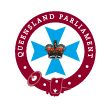-
Work of committees
- Upcoming Committee Business
- About Committees
- Training Seminar - Committees@Work
-
Committees (13)
- Business Committee
- Clean Economy Jobs, Resources and Transport Committee
- Committee of the Legislative Assembly
- Community Safety and Legal Affairs Committee
- Community Support and Services Committee
- Cost of Living and Economics Committee
- Education, Employment, Training and Skills Committee
- Ethics Committee
- Health, Environment and Agriculture Committee
- Housing, Big Build and Manufacturing Committee
- Parliamentary Crime and Corruption Committee
- Supermarket Pricing Select Committee
- Youth Justice Reform Select Committee
- Committees Glossary
- Estimates Hearings
- Inquiries
- Live and Archived Broadcasts
- Publications
- Guidelines (4)
- Subscribe
- Former Committees (57)
- 30 Year Release
- Past Alert Digest and Legislation Alert Indexes
- Ten Year Anniversary
Considered: Auditor-General Report No.14: 2020-21 Responding to complaints from people with impaired capacity - Part 2: The Office of the Public Guardian
COMMITTEE'S CONSIDERATION
In its Report No. 13, 57th Parliament – Annual Report 2020-21, tabled on 18 October 2021, the committee reported on its consideration of Auditor-General’s reports referred to it, including Auditor-General Report 14: 2020-21 Responding to complaints from people with impaired capacity - Part 2: The Office of the Public Guardian. The committee did not resolve to hold further inquiries into these audit reports and made no recommendations to the Legislative Assembly.
Overview
Role of the Auditor-General
The role of the Auditor-General is to provide Parliament with independent assurance of public sector accountability and performance. This is achieved through reporting to Parliament on the results of its financial and performance audits.
About the Auditor-General Report
The QAO audit looked at how well Queensland’s guardianship and administration system manages complaints to improve the protection of adults with impaired decision-making capacity. Part 2 of the report examines whether the Office of the Public Guardian (OPG) has effective systems and processes to receive, manage and review complaints; how timely its responses were; and the effectiveness of the complaint management system (CMS). Part 2 also contains recommendations for improvements to the current system.
Among the QAO findings in respect of OPG’s complaints handling processes were that:
- The OPG reports on the number of complaints resolved within and outside of target time frames; however, data errors mean there is a risk that OPG’s complaints reports are inaccurate.
- OPG does not sufficiently measure or report actual response times for complaints, or trends over time.
- QAO analysis of 2019-20 complaints data found that 36% of complaints were not resolved within target time frames (however, almost a third of complaints were excluded from the analysis due to poor data).
- OPG’s CMS is not properly designed for people with impaired capacity.
- The CMS is not easy to navigate or understand which limits the ability to make a complaint.
- CMS information is written but is not in easy English or supported by pictures to explain concepts, nor are there options such as video or audio for people with impaired capacity or disability.
- OPG has proper complaints management policies and procedures and the internal complaints handling process follows good practice.
- CMS policies and procedures could be written more clearly.
- The CMS information technology system is fit for purpose but OPG staff are not following the process properly or using the system consistently, which leads to poor record keeping and poor data which in turn makes it difficult to assess if OPG is managing complaints effectively.
- OPG staff need clearer guidance on how to receive, record, respond to, and report on, complaints.
- Staff need more support and specific guidance on the complaints management (CM) process.
- OPG has not formally evaluated the effectiveness of the CMS, nor does it seek feedback from customers about its complaint handling, missing possible opportunities for improvement.
- OPG’s complaints data is not good enough to analyse how well its systems and processes work.
- OPG has recently developed a CM focus report that includes observations and learnings and suggested some improvements but the QAO found that there was no formal action plan or evidence that the changes have occurred.
Recommendations
The QAO recommended that the OPG:
- Monitors complaint response times and reports on how many complaints are finalised within target time frames.
- Improves the ease of use of the CMS by making information clearer and easier to understand (using alternative language or video/audio/graphics) and offering an online complaint form.
- Make the CM policy and procedure easier to understand.
- Ensure all complaints received are recorded accurately, and on time, including those received and resolved at a local level.
- Improve CM training and support for staff including targeted training in handling complaints from customers with impaired decision-making capacity, finalising and implementing its internal CM procedure to provide staff with better guidance and support, and review training effectiveness.
- Improve system and process effectiveness by seeking client feedback on complaints handling, developing better data to identify issues and inform improvement, and measure and report on performance.
Referral to committee
Standing Order 194B provides that the Committee of the Legislative Assembly shall as soon as practicable after a report of the Auditor-General is tabled in the Assembly refer that report to the relevant portfolio committee(s) for consideration.
The committee is responsible under section 94 of the Parliament of Queensland Act 2001 for assessing the integrity, economy, efficiency and effectiveness of government financial management by examining government financial documents and considering reports of the Auditor-General.
The Committee of the Legislative Assembly referred this Auditor-General report to the committee on 25 February 2021.
Related Publications
| Publication Details | Type | Published Date | Tabled Date | Committee Name |
|---|
